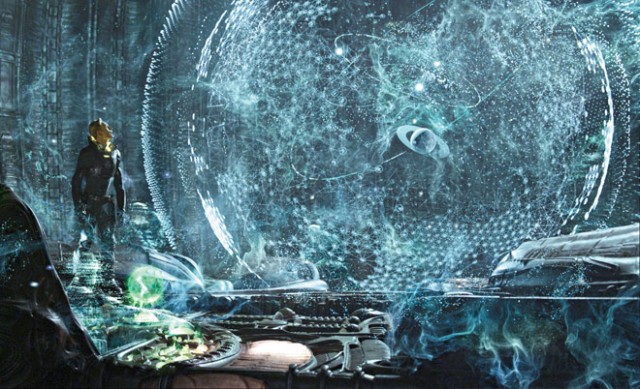
It's no secret that science and the entertainment industry aren't always the best of bedfellows. Back in 2009, I reported from that year's AAAS meeting on NSF's program to encourage responsible science in Hollywood. Then, the message was clear. Hollywood is interested in telling a story, and if scientific accuracy gets in the way, well, it's getting run right over. But after finally seeing Prometheus this past weekend, I've come to realize that the industry's contempt for even vaguely plausible science all-but-guarantees I won't be able to suspend my disbelief. And it doesn't have to be like this.
Warning: spoilers will follow.
My problems with the film began almost immediately. A Lord of the Rings-inspired panoramic landscape gives way to a humanoid standing by a waterfall. He drinks some black goop, and then his DNA begins to fall apart, followed quickly by the rest of him. This mess all dissolves into the river, et voilà—the implication is that humans arose because of this. Just five minutes in and my brain is already beginning to push back against this dreck.
Sadly, it gets worse from there. Prometheus, the titular space vessel, is carrying a crew of scientists to a moon orbiting a planet 37 light years away. This is no mere milk run, as is made abundantly clear. But if these are the best scientists you could find for an interstellar mission 80 years in the future, then the Earth of 2092 is in real trouble. To illustrate, put yourself in the shoes of Rafe Spall's character. You're a biologist, you're flying off to the stars to find evidence of aliens that have been tinkering with life on Earth, and at the first evidence (the corpse of a giant humanoid alien) what do you do? Marvel at the fact? Scan it and take samples? No, you decide you're going to go back to the spaceship for a nice cup of tea. A trillion-dollar mission into space and that's the caliber of researcher on board? I'd go on, except that I'm a week late to the party and others have already done this quite well.
Prometheus is hardly the only offender, just the one I've been exposed to most recently. As a dutiful husband, I took my wife to see Battleship a few weeks ago. Yes, going to see a movie based on the game of Battleship meant I expected something pretty bad. But again, the assault of stupidity in the first few minutes was so overwhelming I was shocked and awed into disbelief, and there I stayed. Perhaps I'm being churlish, expecting that a movie involving space aliens should at least respect or acknowledge the speed of light.
I don't think I am, though. I also don't think it's that unreasonable to expect at least a veneer of plausibility. Make up a wormhole or something. Run your script past a couple of grad students in exchange for some beer and pizza. Set your movie "a long time ago in a galaxy far, far away." But do something. Would it really have killed the Prometheus CGI team to render lots of little enzymes breaking up and rearranging the DNA at the beginning? John Scalzi's Redshirts might be aimed at long-running TV space operas, but the way the crew of Prometheus eschew common sense and basic logic would have them right at home on the Intrepid.
You might think this is just one more nerd ranting on the Internet about a movie they wanted to like but didn't, but I think it's more important than that. The way the media portrays science matters. The wild success of (scientifically implausible) shows like CSI and even Bones has meant a huge upsurge in applications to forensic science programs. Ask the public about DNA and at least a third of the responses will include something about Gattaca, depressing as that may be. Scientific literacy has never been great, but wouldn't the responsible thing be to include a kernel of truth in there so your audience goes home entertained and informed (albeit ever so slightly) at the same time?
reader comments
277